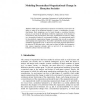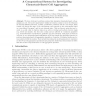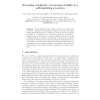117
click to vote
ECAL
2007
Springer
15 years 8 months ago
2007
Springer
Agency detection is studied in a simple simulated model with embodied agents. Psychological experiments such as double TV-monitor experiments and perceptual crossing show the centr...
138
click to vote
ECAL
2007
Springer
15 years 8 months ago
2007
Springer
Multi-agent organizations in dynamic environments, need to have the ability to adapt to environmental changes to ensure a continuation of proper functioning. Such adaptations can b...
130
click to vote
ECAL
2007
Springer
15 years 8 months ago
2007
Springer
We introduce a new variant of the dissipative particle dynamics (DPD) model that includes the possibility of dynamically forming and breaking strong bonds. The emergent reaction ki...
ECAL
2007
Springer
15 years 8 months ago
2007
Springer
ECAL
2007
Springer
15 years 8 months ago
2007
Springer
Abstract. This paper investigates the processes used by an evolved, embodied simulated agent to adapt to large disruptive changes in its sensor morphology, whilst maintaining perfo...
101
click to vote
ECAL
2007
Springer
15 years 8 months ago
2007
Springer
Real organisms live in a world full of uncertain situations and have evolved cognitive mechanisms to cope with problems based on actions and perceptions which are not always reliab...
127
Voted
ECAL
2007
Springer
15 years 8 months ago
2007
Springer
Abstract. We have developed a software system that simulates chemotaxis-based cell aggregation in 2D. The model implemented within the system consists of such cell behaviors as che...
ECAL
2007
Springer
15 years 8 months ago
2007
Springer
A long standing debate within ecology is to what extent ecosystem complexity and stability are related. Landmark theoretical studies claimed that the more complex an ecosystem, the...
ECAL
2007
Springer
15 years 8 months ago
2007
Springer
There is an ongoing debate about whether the words in the first languages spoken by humans expressed single concepts or complex holophrases. A computer model was used to investigat...
115
click to vote
ECAL
2007
Springer
15 years 8 months ago
2007
Springer
Abstract. This paper adopts an interdisciplinary view of the significant elements of ecosystems and the methods by which these might be simulated to explore theoretical issues of r...




